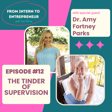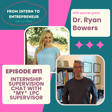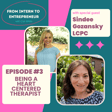Introduction to 'From Intern to Entrepreneur'
00:00:00
Speaker
This is from intern to entrepreneur, the podcast for counseling and therapy graduate students who want to start planning their journey to private practice while they're still in grad school. I'm your host Corey White. And within three years of graduating from my master's program, I had a six figure thriving private practice in large part because I started planning my path while I was still in grad school.
00:00:21
Speaker
This podcast is full of stories and information meant to give you ideas about how you can carve your own path to the therapy career that you want. Please note that when you're listening to this podcast, licensure laws and requirements vary from state to state. So check with your state board about what you can and can't do on your journey. And without further ado, enjoy this episode of From Intern to Entrepreneur.
Benny Perales: Overcoming Addiction and Becoming a Social Worker
00:00:48
Speaker
grad students and future entrepreneurs. This is episode four of From Intern to Entrepreneur. And in this episode, I am interviewing Benny Perales from San Antonio, Texas.
00:00:58
Speaker
That is probably not anywhere close to a Texas accent. I'm from southeastern Pennsylvania. But anyway, this interview was so freaking powerful. Benny opens up about his struggle with addiction and how that led him to becoming a social worker. And there's just so much emotion in the first part of this interview. And I really hope that hearing his story
00:01:21
Speaker
will give you courage to show up in your grad programs and in your career, acknowledging the struggles that you have because that's what makes us human. And it's also part of what makes us good social workers or counselors or therapists or whatever exact path that you're on. But we also talk about so much more. We talk about the importance of getting your own therapist and countertransference. He runs through
Starting Private Practice: Confidence and Research
00:01:42
Speaker
a couple basic things that you'll need to get started in your private practice.
00:01:45
Speaker
And I have to say, I had no idea until the middle of this interview, you might even hear when it happens, that Benny has really just recently started his private practice. He speaks with so much confidence and clarity on what he's doing and the people he wants to work with and his website that I had literally no idea that he had just started it. He talks like someone who's been in the field. Well, he's been in the field for a long time, but he talks like someone who's been in private practice for years.
00:02:12
Speaker
And that's because he does his research. And so I want you to just really hear like, this could be you one day when you start your private practice, showing up with that too much confidence. Like he fooled me. I would have said, uh, probably, you know, 15 years this guy's been doing private practice. Uh, so, so yeah. And, and he's just really a pleasure to listen to and to get to know. And I hope so much that you just take so many little nuggets from his story that you can incorporate into
00:02:40
Speaker
the kind of counselor that you want to be in a way that feels authentic to you. So I'll stop gushing. And, you know, without further ado, meet Benny. Hi, Benny. Welcome to the podcast. I'm so glad to have you here today. Well, thank you for having me, Corey. I'm pretty excited about this. So thanks for having me.
00:03:02
Speaker
Yeah, I know that you have a really interesting story. And so I think that our grad student listeners are going to be really kind of inspired and interested just in the different twists and turns of your journey. So without further ado, I would love for you to start by telling everybody a little bit about yourself, your journey to becoming a therapist, and then your journey to private practice.
00:03:24
Speaker
Okay, and interject at any time because I could be very long winded because I love talking about myself. Love it. So I live in Texas. I live in San Antonio, Texas, born and raised here. I'm a veteran, big part of who I am. I'm part of the LGBT community, big part of who I am. But it's not who I identify as. I'm just a regular person like anybody else.
00:03:51
Speaker
who happens to be gay, who happens to be a veteran, who happens to be a social worker. There were two parts that I was talking to that I thought were really important in discussing my journey, and that was why I became a social worker and how I decided on my niche.
Benny's Recovery Journey and Inspiration
00:04:12
Speaker
I don't normally self-disclose as much as I'm going to here, but I do feel that it's important, especially for people to be able to kind of realize how much of a difference they can actually make in their profession. So I had a horrific drug and alcohol addiction. You know, a good day for me would be hopelessness because there are darker places than that.
00:04:42
Speaker
I had literally burned my life to the ground, destroyed relationships. Like I couldn't even look at myself in the mirror. There had come a point where I had so much shame that I couldn't look at myself in the mirror. In fact, uh, when I had an apartment, I had actually gotten newspaper and put it up on the mirror, except for a little square.
00:05:09
Speaker
So I didn't have to see myself, but I could see enough to shave. You know, and every day was this battle to not use. Yeah. And 99% of the time I lost. And I learned very quickly that any time I engaged, uh, that voice in my head, I lost, but I didn't know that until much later when I started getting well. Um, so.
00:05:39
Speaker
Eventually, it got so bad that I ended up going to a drug and alcohol treatment program that was set up by the VA. And I had to go to it more than once. In fact, I went to my first 12-step meeting when I was 25. I went to meetings for 15 years. And I'm not the person that did not go to meetings during that 15 years. Because a lot of people will go, it's not for me, they leave, or they go and they disappear.
00:06:09
Speaker
their addiction takes them, not me. I showed up high, I showed up angry, I showed up drunk, I showed up in any way that you could think of. Because for me, I knew that was where I was supposed to get well, get sober. And I really, I had no other outlet that I could find except that that helped me because I could get a week, I could get a few months, once I got a year. But
00:06:35
Speaker
The addiction, addiction is just an insidious disease and it allows you, like you're trapped in your own mind. And so for 15 years, I tried to get sober and I couldn't and things got so bad, um, that I ended up in a treatment program and there was a social worker named Jamie, a VA social worker. And she changed my life. She was the,
00:07:05
Speaker
only person who believed in my ability to get well. I had burned so many bridges. I had been in 12 step meetings for 15 years that people just figured that it was not going to happen for me. It just wasn't. And I remember being in one meeting after a relapse and in the middle of the meeting, I just wailed, burst into tears and screamed, I can't believe I need a miracle to stay sober.
00:07:35
Speaker
I just couldn't believe it because I've been trying so hard. And for me, I had gotten to a point that I needed a miracle. And part of that miracle was the social worker showing up in my life. And while I was in that program, I would see her every week. She always seemed very happy to see me. I never felt criticized or judged. I felt welcomed. And she had one thing.
00:08:02
Speaker
that nobody else had for me that I didn't have even for myself. And that was hope. I didn't have any hope. And she believed in me so much that I just held on to the hope that she had for me because that's all I had. And I finished the program and I didn't last maybe three months before I had another relapse.
00:08:32
Speaker
I would go to her, I would go to her office and no matter what was going on in her life at work, when I knocked on that door, she would open it up. She'd be happy to see me and she made time for me. There were days I had to wait two, three, four, five hours to see her, but she always made time to see me. And it was through her and her belief in me and the work she was doing with me that one day as I started getting well,
00:09:02
Speaker
I found my own hope.
Finding Hope and Helping Others
00:09:05
Speaker
I started to believe in myself. And things started to change. But it doesn't mean that I didn't struggle. And a very horrific thing happened. I ended up having a really bad overdose. I ended up on life support for six weeks. Didn't know that I had, I was gone and didn't know it until I came to, and that is the first time I truly believed
00:09:32
Speaker
that if I didn't stop, I would die. So I went back to this social worker and like before, she didn't lose hope in my ability to get well. And slowly but surely I started getting very well. And it was her impact on me made me realize that one person could really change the trajectory of another human being's life.
00:09:58
Speaker
For me, she set the foundation for the miracle of my life to happen. She was the center of my hurricane, and it was the safest place I could always go to. And I knew I could always go there. And when this realization came that, wow, she changed my life, literally, is when I came to realize that I want to do the same thing for somebody else. Because I knew that it was possible.
00:10:27
Speaker
The fact, it was a fact that one person could change another one because I was that person that changed. Let me tell you, I have a beautiful life. It's not perfect, but it's a beautiful life. I think those 15 years, what they did is
00:10:43
Speaker
They allow me to have an appreciation, a real deep appreciation for the life I have today because of that experience. And I will tell you that I haven't had any mind altering substances in over 12 years. Next month will be 13 years.
00:11:02
Speaker
Yeah, I know it is amazing so before so before I used to say I'm a member of a 12-step program in today's I get to say I'm a sober member of a 12-step program Which is like for me amazing? But it's a direct it was a direct Outcome from working with a social worker. Yeah, it could have been an LPC could have been an LMFT it could have been an
00:11:29
Speaker
Anybody in the mental health field, it just happened to be a social worker. And I believe that people in this field have the capabilities to make those kinds of changes. And I will tell you, not everybody's going to know that they had that kind of impact on someone. But that's when I decided I want to be a social worker because I want to be that hope for somebody that doesn't have it. Yeah. So when went to school, got my bachelor's degree, got my master's degree and
00:11:58
Speaker
When I graduated, I went to her and I told her basically the story and I thanked her for being there for me. Because today wouldn't have happened if you weren't there. And so now I'm a social worker and I've had, and I may never hear this coming from any client that I work with, but I don't have to to know that I'm making a difference. You know,
00:12:28
Speaker
Yes. I think it's so beautiful too for grad students to be able to hear this story because in some ways I think all of our journeys impacts the type of therapist that we become or our driver for that. I think that what you're talking about is like a long ass time of struggle. Yes. It's not a joke. No. And then a beacon of hope in someone
00:12:56
Speaker
that transformed your life that made you want to do this for other people. Like that is beautiful and could not have happened without your struggle. Yes, I agree 100%. I think the challenges that we all face in our life kind of, well, they help define who we are and how we view the world. And part of that is deciding like what kind of profession we want to work in.
00:13:21
Speaker
For me, it was an epiphany that created a calling to be able to do the same thing for somebody else. Just to go in the nugget for your listeners is one thing that I think is very, very important for people to realize when they're working with clients is, and this comes from my experience as a sign language interpreter, body language, facial expressions provide 80% of our communication. It's 80%.
00:13:52
Speaker
If you're sitting in front of a client and you don't want to be there or you find them difficult to work with, or you don't like them, if you're not mindful of how you look, facial expressions, body language, eye movement, mouth movements, they're going to know, especially people who are dealing with trauma and substance abuse. And a lot of times they come together.
00:14:17
Speaker
because one of the things that we have learned as a survival skill is to be able to look at someone and know if they're safe or not. Read the room. Yes. And so if I'm sitting in front of a therapist and they give me a look or they tilt their head a certain way or their tone changes, I will know and I will shut down and it will be very difficult for you to help me at that point because it's no longer safe.
00:14:45
Speaker
And I think that, you know, based on what you're saying about your story is that when therapists come from a place of genuinely wanting to help people, that's not going to happen. Right. Um, thank you for sharing. That is a vulnerable story. I really appreciate you sharing that. And I think that it's going to resonate with so many people. Cause I also think that sometimes in grad programs, we think we have to enter them and go.
00:15:11
Speaker
I'm perfect. I just want to help everybody. And it's like, if I say that there's something that I've struggled with, or if I say that there's something wrong with me, then are people going to think that I'm competent? Are people going to judge me? Are people going to? So I think that it's so important for people to tell the stories about what got them into the field because I don't know if I've met a therapist to this day.
00:15:33
Speaker
that hasn't come into this field because of their own shit in some way? Yes, I completely agree. Everybody has their own baggage to carry. Some people have a little knapsack, other people have a duffel bag, some people have a whole dump truck that they have to carry through their life. But you know, it's everybody's journey. I will say that it was there was a debate, an internal debate of, do I open up? Do I not open up? This is going to be public.
00:16:02
Speaker
And when it was all said and done, I have always been my authentic self. I have always lived my life authentically. And I believe that this is so important that I'm willing to share. Yeah. Which I will tell you has brought up a lot of emotions up to this point. But I've gotten comfortable being uncomfortable sometimes. Yes, yes.
00:16:33
Speaker
I love it. I just have nothing else to say, but I love it, and it's going to be so valuable for people to hear your vulnerability. And I hope that it gives people listening permission to also be exploring themselves while they're going through their grad programs so that they're able to identify these same things that you're able to identify. Because I imagine it makes you a great therapist, a better therapist, that you know all of that about yourself and that you know that was your journey.
00:17:02
Speaker
Yes. So some important things with that is, I think what's really important is to be able to embrace the experiences of your life. But you can't do that if you're not willing to look at the pain and the struggle. And sometimes the only way you can do that is through getting therapy. And I will tell you that I've done four major therapeutic
00:17:31
Speaker
sessions and when I mean sessions, it's like timeframes in my life where I need therapy. So I go get therapy for several months or I get therapy for a couple of years. So I've had four of those in my lifetime and it's helped me really understand me, how I function in the world, how I view myself, how I interact with other people and how my personal experience can benefit the people I work with. And I feel if I hadn't done that,
00:18:00
Speaker
A lot of countertransference would have occurred. I could have been re-traumatized. I've got to re-traumatize my clients. You know, I would have a hard time with compassion fatigue, with burnout. I mean, so many things could happen that wouldn't be helpful in the long run. And I've did a lot of research papers in grad school regarding burnout. 20% of all social workers leave the profession within five years when I did my research like eight years ago.
00:18:29
Speaker
Yeah. So taking care of myself is part of, is part of doing therapy. Yeah. And because people listening at this point might not know what countertransference is, I want to define that because what you're saying is so important. So countertransference is basically when I'm sitting in the room with my client, how I am feeling about what they're bringing up. So what they're bringing up is how that's evoking things in me. And as therapists, when we are unchecked in our own mental health,
00:18:58
Speaker
that can really be detrimental to our clients if we're having an emotional reaction to something that they're saying that we don't even realize. And so any graduate listening, please go get your own therapy. How can you be a therapist? I mean, you can, you can, and people are doing it, but how can you be a good therapist if you don't know what it's like to sit in the client's seat? I'm so glad you said that because I'm 100%
00:19:23
Speaker
If you're in that chair, you know what it feels to be asked, questions that make you look at yourself in a way that you don't want to admit to things that you've been ignoring for a long time. But what you come out as is just a better refined version of yourself. Yeah, agreed. Okay, co-sign that.
00:19:48
Speaker
Hey, grad students. Real quick, before we get back to this interview, if you are loving the idea of being a part of a community of like-minded graduate students who want to own their own private practice one day, then you need to head to Facebook and join my Facebook group from intern to entrepreneur. There's already a community set up of graduate students who one day want to own their own private practices and be entrepreneurs just like you.
00:20:15
Speaker
So head over to Facebook, join that group, and stay in the loop and get connected with people who are doing things that you want to do. Back to the interview. So help me understand then how you ended up in private practice.
Career Transition to Private Practice
00:20:30
Speaker
What was that journey like? So you had this transformative experience. You get into a bachelor's program, a master's program. You graduate. And how do you get to private practice from there? OK.
00:20:45
Speaker
My goal was eventually to do private practice. That was the goal. However, I felt at that point unprepared to just go straight into private practice. And I do know other people that are already setting up private practice while they're in their last semester or their last year. They're getting things in order. And it does take time. I didn't realize how much time it takes, but it takes a lot of time and effort.
00:21:09
Speaker
And so my first job, I worked in corrections. I dealt with people who drunk driving or substance abuse. People get arrested for homelessness because they're on somebody else's property. I also worked with people who committed murders, sex trafficking, child abuse, the whole thing. The people I really tended to work with are the people who got long-term sentences or life sentences because that dealt with grief.
00:21:39
Speaker
And I ended up realizing I love doing grief work. And I learned that from my internship. And they say, try something you like and something you would never do. And grief work was something I never thought I would do. And it turned out to be a really good fit for me. So anywhere I work, I want to work with grief because I think it's a universal experience, regardless if you have a mental health diagnosis or not. It's something that we all experience. Even from early childhood, we experienced grief.
00:22:10
Speaker
So then when I left there, I got a job at a psychiatric hospital because I really wanted to learn a lot about the DSM.
00:22:18
Speaker
Because at this point, I'm really starting to think, I'm going to open up a private practice. I want to open a practice. And so I want a position where I can learn a lot about actual, like, mental health diagnosis, a DSM. And I worked in admissions. You see them come in when they're at their worst. And when I say their worst, their mental health is they've decompensated so bad that they need to be inpatient.
00:22:42
Speaker
And what's really great about working in the psychiatric hospital is that you get to see a lot of the DSM. But just as important is you get to see one diagnosis and the spectrum of that diagnosis. Absolutely. Is amazing. Absolutely. Because you can have somebody who is unaware that they're having voices to someone who is aware that they have voices.
00:23:09
Speaker
Someone who's trying to hide the voices from you because they don't want to get admitted to someone who's letting you know I need to be admitted because the voices are getting to be too much. One of the most disturbing things I've seen is I've seen a man
00:23:23
Speaker
whose voices were so unrelenting that I could hear him from behind two closed doors hitting himself. Cause all he wanted was those voices to stop. So I've seen, I've seen a lot and how it benefits me is in my mind, the way I see it is I'm going to be working with clients and some of these clients may be in a position one day where they need inpatient care. Because of my experience in a psychiatric hospital, I can see the beginnings
00:23:51
Speaker
and the onset of someone decompensating to a point where they need inpatient care and I can get them there sooner compared to later where consequences could be much more grave. Sure. So I worked in admissions and then I got promoted to a director of social services.
00:24:09
Speaker
which was a different job altogether. I went from working with patients to managing people and it wasn't a good fit. And right when I was finishing, like I've learned enough in admissions, I was already thinking about private practice. So I was already planning. And so I decided this is what I want to do. So my niche, and I think everybody finds their niche either by accident, like,
00:24:35
Speaker
People come in and you just start gravitating to this population because they excite you. You tend to do really well with them. You see results. And then other people very purposely decide to work with the population because that's a population they kind of really feel they can do their best work. So
Working with Terminally Ill Patients
00:24:53
Speaker
the way I ended up finding my niche is through my own personal experience. My niche is to work with people who have been diagnosed with life-threatening illnesses.
00:25:05
Speaker
mainly cancer patients, people who have a terminal illness, grief work with people who have lost a loved one to include pets. And the reason I decided on this niche is because I'm a six-time cancer survivor.
00:25:19
Speaker
So this is the longest I've ever been in remission, which is seven years, the longest. But my first diagnosis was at 30. My last diagnosis was at 44, somewhere around there. It was during my second to last semester in grad school. And I will tell you not one time during that, those six diagnosis through each of those treatments that anyone ever suggests seeing a therapist.
00:25:47
Speaker
Yeah, not one, not one. Wild. Yeah, I had doctors working with me, nurse practitioners, nurses, social workers working with me, and no one ever said, maybe you should go see a therapist, you know, because this is going to be very challenging, very difficult. You're going to have all this stuff, not once.
00:26:07
Speaker
And so when I was deciding my niche, I had five different ideas. Some were very practical and some were very passionate. So substance abuse, obviously. The cancer patients, obviously. Then I thought substance abuse for CEOs and executives because they'll do private pay because they don't want
00:26:31
Speaker
anybody to know their business, so very practical. I had the Deaf community because I was a sign language interpreter for 13 years, but I retired from that role because
00:26:47
Speaker
how draining it could be, but I came up with five, and I couldn't decide. So what I did was I picked people who knew me very well, and I started telling them, these are my ideas, and then I'd talk about each one. And it was my brother who identified the one that he thought would be the best fit, and is working with people who are really, really ill. And he said it's because you got so excited, you got so animated, I couldn't even ask a question,
00:27:16
Speaker
And then when I reflect, that was really how it was with everybody else. And so that was my niche. And I really feel, I truly believe that this is where I can make the biggest difference as a therapist in my community. And there's a little nugget right in there too, that I don't know if you realize you said, but I think this is important for grad students that you're not going to know when you're in grad school, what your niche is going to be, the exact population you want to work with.
00:27:43
Speaker
But you should be starting to talk about it and talk about it with people in your program and talk about it with people out of your program. They're going to be the ones that see the light in your eyes when you talk about something. I've had so many conversations with interns that I've had or people that I've mentored in some way where they come up to do the same thing. They give me these ideas.
00:28:03
Speaker
And I'm like, okay, you didn't care at all about that one. But when you're talking about that one, you're excited and just passionate. Like that's the direction that you go in. And so yeah, you should absolutely love that your brother was like, hang on, Benny. Yeah, I can't even get a word in edgewise here. Like that's your direction.
00:28:24
Speaker
And he was absolutely the standpoint. And this is also something that happens, it's very common with grad students. They do come in with an idea of who they want to work with.
00:28:34
Speaker
And then later on, they're like, no way. And they find something different. That's very, very common. I think it's important that what you mentioned is really explore the options. And it's much broader than you would ever expect. In fact, this week, I met with a colleague who hadn't seen in a while who joined a group practice.
00:28:56
Speaker
And things aren't going as fast, or her clientele isn't growing as fast. And so I just asked her, who do you want to work with? And she says, well, really, I would like to work with gamers. And I'm like, and I already know how this works. I already got my questions. So what is it about gamers that you think is very interesting? And so she goes on this tangent, and she lights up, and she's smiling. Her eyes are bright. And then she says, but I don't think
00:29:24
Speaker
It's something that people do and I'm like, what? And so I started talking about, you know, gaming addiction and conflict within families because maybe a teen is that's all they're doing. They don't have any activities out of the home. They they're not going to work. They won't move out of the house. And we've gotten people who have actually been very, very sick. And I heard of one instance where somebody actually died because they just would not stop.
00:29:49
Speaker
And I'm like, I don't know anybody. I don't know anybody, but I know a lot of gamers. And so I said, let's go on the website. And so we went to psychology today. We looked at game addiction. Like eight people came up. We went to their website. I said, do you think a gamer is going to feel comfortable in that room?
00:30:07
Speaker
Does this person look like they really understand gaming? Look at their website. Does it say anything about they understand gaming? She's like, no. So what you're saying is that they put on their Psychology Today profile that they specialized in that, but then when you went to their website, there was no hint of it. None. And so that's the thing is for me, part of my private practice journey is making sure that I speak to my target audience, that
00:30:36
Speaker
So part of the research that I did, and I did a lot of research, is looking at other therapists' websites to see what type of content they had, what feelings, what colors, what fonts, what messages. Because you have to, in one very quick website, because people will stay on, I think on an average, they stay on five seconds before they go on and list they're captivated, and then they'll look at your website.
00:31:04
Speaker
The ones that really attracted me were the ones that I could tell before I even read anything what their population was. Yeah, absolutely. So my website, if you go to my website, you will look at my hero page or my hero picture and the hero picture is the first picture that you see at the top of the website. You see it and you know my population. Yeah.
00:31:24
Speaker
And so I was letting her know that your first page very easily will be identified as a gaming therapist. Yes. And then I give her ideas. And I love doing this with people, just brainstorming, because for me, it's still very, very exciting. But it does take a lot of work. And so one of the suggestions I would make for grad students is if your goal is to do private practice, start doing some research of what that looks like. Like, what do you need?
00:31:50
Speaker
Uh, to own your own private practice because it's a lot more than you will suspect. Yeah. Yeah. I think that sometimes people, I think people get on two ends of the spectrum here. They either think like it's nothing. I'll just like start
Steps and Challenges in Starting Private Practice
00:32:03
Speaker
a business and it'll be great and everybody will come to me. And then there's the other camp that's like, Oh my God, I could never, I'm not good enough. I don't like,
00:32:11
Speaker
And so I think that, yeah, it's in the middle. It's possible. But it does take a lot of work and planning. You can't just walk into an office one day and go, oh, you know what? I'm going to hang a shingle. And this is my private practice. And people are going to come to me. And I'm going to have a website and all that stuff. You do need to know what you're doing. Yes. I'll run through some steps. And it's not on campus, but just to give you an idea of the kinds of things you have to think about. So you have to make the decision that it's the right time.
00:32:39
Speaker
The imposter syndrome will come in and you're like, yes, it's the right time. And then you'll start having these really huge self doubts and fears. And you're like, no, no, no, I'm not ready. And you have to kind of work through that. So you have to make the decision. Then you have to think of like, okay, I'm going to open a private practice. What's that private practice going to be called? And so that's a journey. I literally had like 56 different names and most of them were already taken. Yeah. And then the name I ended up with.
00:33:10
Speaker
It wasn't even on the list. And my practice name is Behind the Therapist Tour. I wanted the word therapist in there mainly because when people Google, they Google therapist or counselor. I don't know, the name just came to me. And for me, it's a concept.
00:33:27
Speaker
behind the doors where we have this confidential conversation. That's where the work happens. It's a safe place where you can come and share, you know, that idea that this, this is where it's all going to happen is behind the therapist door. And I have all these ideas of how that can look like, like in the office and in the room. And so then when you come up with a name,
00:33:49
Speaker
you got to go see if the domain name is available. Yeah, absolutely. And so if one is available, and if it's available, then you got to go to the state to see if the actual business name is available. Yeah. And if it's if one of them is not, then I would suggest finding another name. Yeah, keep moving. Yes. And that I was very lucky. Mine were both available. So I got it for other people. It's a challenge.
00:34:12
Speaker
After that, you got to get registered with your state, get your LLC, PLC, sole proprietorship. You have to pay a fee. People say go to a lawyer and get it done. I did it myself. YouTube saved me so much money. YouTube helped me do all my stuff. Then you have to decide on your niche and I told you my process in doing that. Then you have to figure out all the documentation that you need.
00:34:37
Speaker
There is a YouTuber whose channel is called Private Practice Skills. Her whole channel is about building a private practice. Okay, I'll link that then in the show notes. It's amazing.
00:34:53
Speaker
And she even has a free document that you can get that lists all the things that you need. Even to like getting a HIPPA compliant phone number, everything. Then you have to decide, is it going to be telehealth? Is it going to be in an office? Is it going to be both? My population, I decided to start off.
00:35:17
Speaker
telehealth because a lot of my patients are probably going to be ill. And just getting up and getting out the door to their treatments is a job in itself. And so I do need to provide telehealth for them. Eventually, I think there'll be people who will need in office and so that will happen.
00:35:37
Speaker
And then you have to do the training. Yeah. Like you have to figure out, so if I'm going to work with cancer patients, what therapeutic modalities do I think are a good fit for me and a good fit for them? And so for me, it's acceptance and commitment therapy. So I found the best one I could find and I did that. Meaning centered therapy.
00:35:58
Speaker
Perfect. You have to find meaning in your life. Dignity therapy deals with people who are dying. And so it's really developing like a story and writing it down and providing a documentation, kind of leaving a legacy. And then you have to think about what's your overall goal with clients. And for me, it is helping people find meaning in their lives.
00:36:21
Speaker
hyper focus on it and find interventions to actually live that life and identify what legacy you want to live, leave behind. And that's what I do with my clients on top of helping them deal with their emotions, the stressors, you know, physical ailments, all that stuff that that is the other part that I work with as well.
00:36:43
Speaker
Yeah, it's something. Yeah, it's a lot. I think that's
Training in Specialized Therapies
00:36:46
Speaker
something I really want to highlight about what you're saying is that, and this I think helps with imposter syndrome is that yeah, there's going to be a lot of people who are listening to this that go, but I couldn't specialize in something like I don't know anything about that. And it's like, there are so many different trainings that you can do that if you have one training on grief, you probably know more than 99% of the population about grief, right?
00:37:08
Speaker
So being able to identify, this is what I want to specialize. These are the people that I want to help. You just have to go out there and find the resources that will help your counselor skills, what you're getting from your grad programs.
00:37:20
Speaker
and kind of supplement some of that. So I think that's beautiful. And I'm going to tell you, you are in grad school. You are doing research papers. You're actively reaching. So you have the skill to do that. I have found the books that are very supportive. I have found peer-reviewed articles on cancer patients and resiliency, psychosocial stressors with cancer patients, the 5 million dynamics and how it affects everybody in the family.
00:37:50
Speaker
I mean, I have found organizations for people who are dying. Like we have an organization, it's a national organization. I'll email you the name of that organization, because I don't know right off the bat. But their purpose is to come and sing songs for people that are dying at their bedside. Oh, that's beautiful. And we actually have a chapter here in San Antonio. So it's a resource that I can provide
00:38:19
Speaker
that I've never heard of, but I did my research because this is the population I'm working with. And even though I've just started, like you said, I know a lot more about this particular topic than a lot of other therapists who have been doing this for years.
00:38:36
Speaker
Yeah. Well, if we circle back to the point that you made earlier about passion and finding something that you're passionate about, if you're passionate about whatever it is you want to work with, whoever you want to help, it will not be hard to find these resources because that's part of your drive. That'll be part of what you want to do. So yeah, there's a lot of what you're saying that is just so full circle. But how long into your private practice are you right now at this point?
00:39:03
Speaker
Well, I think it's great that you're asking me that because you're going to meet people at different stages of their private practice. I'm literally at the beginning of my private practice. So you're really hearing an account of what it's like. Like it's fresh in my mind of what it's like, the frustrations. Like I built my own website.
00:39:24
Speaker
And I'm very proud of my website. My website's really pretty. Your website does look really good. I'm a big judge of websites and I did check yours out and that's awesome. You did great. And it speaks to specifically like if you're a cancer patient or a terminally ill patient, you know exactly that I'm the guy that will work with you and knows what they're doing. And I use YouTube for that. But all of these were challenges that I overcame because of my desire to want to work with these people. So yes, if you find your passion
00:39:54
Speaker
You'll be willing to do the work. Yeah. Yeah. And I love, I'm so glad that I'm getting the voice of someone who is at the beginning of their private practice journey, because listen to how much excitement that you have talking about that kind of like vigor and like life you have around this.
00:40:10
Speaker
and how exciting it really is. And I'm sure, and very scary. Very scary. You know, I'm not sure if you kind of met your financial goals yet or not, but that's a journey in itself. And yet you can be on the road on the journey toward it and still love what you're doing. Yes. So I'll tell you how I'm surviving right now financially. So I stepped out down from my director of social work position.
00:40:39
Speaker
But I'm a PRN at the same hospital. So I can work as much as I want because they have enough work for me to be able to work 40 hours. But it also allows me the flexibility to network, market, work on my website as I start getting clients, block that time out. So I do have income that's coming in. It's not as much as it was, but it's enough to cover my bills.
00:41:01
Speaker
because I know if I do what I'm supposed to do in my practice, that will grow. And I suspect I'll earn more than I did when I was a director. I really do. And so and I do have some savings. So that helps as well. So I still get to eat with my friends. I still get to go to the movies. I have some luxuries that I have. But I'm more mindful of how I spend my money, which is which is in my perspective, how a smart entrepreneur lives.
00:41:31
Speaker
right, is mindful of their money and what they're doing with it and being able to set the money aside for the things that they actually want to do and need and stuff like that. But then also being really mindful of if I'm going to build a successful business, if I'm going to build a successful financial enterprise, then I need to be, I need to be conscious of money and what I'm doing with it. And the other thing that you're saying that is come up again and again in all of the stories of the people I've talked to and is, was really important in mind included is that there was a primary,
00:42:01
Speaker
financial stability while the secondary private practice got started. And there's a, there's a titration of people going less and less and less and whatever their first full time job was or whatever, even if it wasn't full time, whatever their financial stability was while they allow their practice to kind of transition and build and grow. And I think that's so important that grad students know
00:42:24
Speaker
I mean, I worked in a restaurant. I was a bartender. So I was working in restaurants and then I had this therapy practice. And that's how I got my stability in order to be able to have a group practice that I have now just a few years later. So people need to hear that. Yeah. And I think I had a thought and it kind of slipped through my mind. But when it comes to finances,
00:42:48
Speaker
is you have to think it's the same mindset. Like going to grad school, I have to make all these sacrifices to go to grad school. Some people are very fortunate to go on scholarships and they can work part time. Some people don't work part time. There are people that have to work a full-time job and go to grad school full-time. And some of them were in my cohort.
00:43:07
Speaker
It's the same thing with a private practice. What are you willing to sacrifice? Because sacrifice has to be a part of building this practice. You got this huge goal. So a sacrifice that I have to make sometimes is sometimes I can't go up with my friends because that money needs to go to let's say marketing or
00:43:28
Speaker
going out to eat with other therapists who are networking together. Sure. And so what I'll do is instead of that, I buy groceries and I invite my friends over and I cook a meal for everybody, cost effective. And I'm still eating and I got leftovers. You just have to find ways to be able to save money where you can still build your practice. And for some people- That's the entrepreneurial spirit. Yes, yes. And I will say some people grow very quickly, some people grow very slowly.
00:43:56
Speaker
I think I'm growing very slowly. However, if I keep doing what I'm supposed to be doing, I honestly believe my hard work will eventually pay off. Yeah, absolutely. I think in most of the people that I've talked to, I need to make graphs. I'm not a graph person, but I've been talking about graphs a lot today. In most of the experiences that I've had in talking with people, it's
00:44:19
Speaker
the beginning of the graph is very slow and then something happens and it picks up and, and there's a rocket and usually that's correlated to the person finding their groove, finding what works because at the beginning you just don't know. So yeah, let me, okay. So if you could offer our audience here one piece of the most important practical advice for their entrepreneurial journey, what would that practical advice be?
Setting Boundaries to Prevent Burnout
00:44:45
Speaker
So this was something I learned the hard way, but I think it's something that you need to keep in your front pocket, not your back pocket, is the power of no. Say more. Yes.
00:45:00
Speaker
We are a profession that wants to help people, wants to be there for people, wants to support people. And that's in the workplace as well. It's with our colleagues, it's with our supervisors, it's for the company. And we can find ourselves in a very challenging work environment if we don't learn how to set limits and say no. At the beginning, when I started, I had found myself in a pit goal a couple of times because I kept saying, yes, I can do that. Yes, I'll do that. I can take care of that for you.
00:45:31
Speaker
Then all of a sudden I'm overwhelmed. I'm not getting things done on time. My quality of work is being sacrificed. I'm not sleeping well. I'm being on stress. I don't want to be here anymore because I just didn't learn how to say no. I wasn't listening to my intuition. I wasn't listening to my ability to do the work and the kind of work and the quality of work that I want to do.
00:45:52
Speaker
And saying no was an uncomfortable process for me. I went to you today, it's like, I can't, I know. And I don't even have to justify it today. Something as simple as, hey, Benny, something as simple as, Benny, are you coming into work today? No, I won't be able to come in today. Yeah. That's it.
00:46:12
Speaker
I don't need explanation. It might be because I need a man helping. It might be because I'm tired. It might be because I don't want to. It could be other things. My mom's sick, I'm sick, my child's sick. But the thing is that, frankly, it's none of their business. My colleague may be annoyed that I don't want to help with their work, but it's not because I don't want to. It's because I got my work to complete. Yeah. Nose protect you.
00:46:39
Speaker
Yes, they do. Those are a boundary. They're boundary setting. So I remember being asked, hey, Benny, would you like to be a supervisor? And I knew that I hadn't been in the position long enough to be a supervisor and lead others to be successful in their job. And so I just said no. I wanted the promotion. I wanted the pay raise. But I knew the consequences were just too great. And it would affect my confidence.
00:47:05
Speaker
It would affect my self-esteem, how I view myself. I'd end up quitting. So I was like, no. So learn the power of no. It is a boundary. It is a healthy boundary. Love it. So then what is the most important piece of mindset advice that you could give people on their entrepreneurial journey?
Embracing Courage as a New Therapist
00:47:26
Speaker
Okay. This is a practice that I've done. So embracing courage. Embrace courage.
00:47:36
Speaker
As a brand new therapist, social worker, mental health provider, you're going to have lots of moments where apprehension, anxiety, and even fear will come up and you just have to embrace the courage to walk through it. It is a mindset.
00:47:51
Speaker
And that's really what courage is, is walking through fear. And that is something I'm like seven, eight years in, and it's something that I still have to incorporate. Like right now, starting my private practice, it has been embracing courage on a daily basis. Yes, oh yes. So that is my big mindset, embrace courage.
00:48:18
Speaker
Yeah, I think that's such beautiful advice too for grad students. Because if they want to get to the place where they can live the life that is going to fulfill them, they're going to have to do things that require courage. Because unfortunately, in our field, the path that we are told we are supposed to take often
00:48:43
Speaker
is one that has been cemented in terms of you have to work in these kind of settings for this kind of pay, for this many hours, see a million and five clients. And so I think it takes a lot of courage for people to start pushing back against that mindset toward what they actually want, whatever it is that they actually want. And actually you hit a point that I really wanted to say is if you can't find the job that you want, create it.
Creating Your Own Opportunities
00:49:12
Speaker
Yeah. That's what I did. I want to be an oncology social worker. They're hard to come by. Yeah. I looked. I couldn't find one. So I'm opening my private practice and this is a population I'm going to work with. I have created a job for myself to meet my passion. Yeah. So if you can't find it, sorry, if you can't find it, create it. No, that's like a mic drop moment, like bang. Yeah.
00:49:37
Speaker
Benny, this has been an amazing podcast interview. What I would love to do is I would love to have you back on in like a year, see how your private practice has progressed and what you've learned from the beginning to, okay, I'm in it for a hot year or two or whatever point you feel like you can come back and have some like new nuggets of things that you've learned in the months to years that it takes you to get to the next point. So I appreciate your time. I appreciate your vulnerability.
00:50:07
Speaker
vulnerability. And I'm sure that all of our listeners are really going to benefit from hearing your stories and your nuggets. So thank you so much. You're welcome. And I hope it's a fairy tale a year from now. Me too. I feel like it will be. The universe is telling me, yes, it'll be a fairy tale down in Texas. But thank you very much for having me on. I really appreciate it. You're welcome. Thank you.
00:50:31
Speaker
I hope that you loved this episode of From Intern to Entrepreneur, and if you want to learn more about what we talked about, check out the show notes. If you love this podcast and you want to support me in continuing to create content for entrepreneurs, then please share this with a friend, a grad student who you think might want your own private practice one day, and also like, subscribe, and review this podcast wherever you're listening to it.














